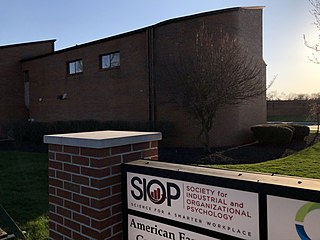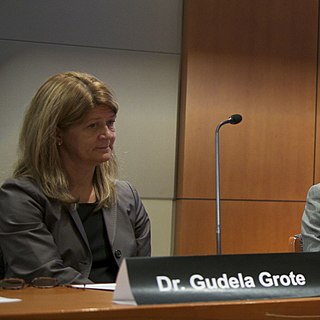Related Research Articles

Industrial and organizational psychology is the science of human behavior in the workplace and work-life interface. It is an applied discipline within psychology and is an international profession. Depending on the country or region of the world, I-O psychology is also known as occupational psychology in the United Kingdom, organisational psychology in Australia and New Zealand, and work and organizational (WO) psychology throughout Europe and Brazil. Industrial, work, and organizational (IWO) psychology is the broader, more global term for the science and profession.

Psychology is the study of mind and behavior in humans and non-humans. Psychology includes the study of conscious and unconscious phenomena, including feelings and thoughts. It is an academic discipline of immense scope, crossing the boundaries between the natural and social sciences. Psychologists seek an understanding of the emergent properties of brains, linking the discipline to neuroscience. As social scientists, psychologists aim to understand the behavior of individuals and groups.

The American Psychological Association (APA) is the largest scientific and professional organization of psychologists in the United States, with over 146,000 members, including scientists, educators, clinicians, consultants, and students. It has 54 divisions—interest groups for different subspecialties of psychology or topical areas. The APA has an annual budget of around $125 million.

Applied psychology is the use of psychological methods and findings of scientific psychology to solve practical problems of human and animal behavior and experience. Educational and organizational psychology, business management, law, health, product design, ergonomics, behavioural psychology, psychology of motivation, psychoanalysis, neuropsychology, psychiatry and mental health are just a few of the areas that have been influenced by the application of psychological principles and scientific findings. Some of the areas of applied psychology include counseling psychology, industrial and organizational psychology, engineering psychology, occupational health psychology, legal psychology, school psychology, sports psychology, community psychology, neuropsychology, medical psychology and clinical psychology, evolutionary psychology, human factors, forensic psychology and traffic psychology. In addition, a number of specialized areas in the general area of psychology have applied branches. However, the lines between sub-branch specializations and major applied psychology categories are often mixed or in some cases blurred. For example, a human factors psychologist might use a cognitive psychology theory. This could be described as human factor psychology or as applied cognitive psychology. When applied psychology is used in the treatment of behavioral disorders there are many experimental approaches to try and treat an individual. This type of psychology can be found in many of the subbranches in other fields of psychology.

Counseling psychology is a psychological specialty that began with a focus on vocational counseling, but later moved its emphasis to adjustment counseling, and then expanded to cover all normal psychology psychotherapy. There are many subcategories for counseling psychology, such as marriage and family counseling, rehabilitation counseling, clinical mental health counseling, educational counseling, etc. In each setting, they are all required to follow the same guidelines.

Health psychology is the study of psychological and behavioral processes in health, illness, and healthcare. The discipline is concerned with understanding how psychological, behavioral, and cultural factors contribute to physical health and illness. Psychological factors can affect health directly. For example, chronically occurring environmental stressors affecting the hypothalamic–pituitary–adrenal axis, cumulatively, can harm health. Behavioral factors can also affect a person's health. For example, certain behaviors can, over time, harm or enhance health. Health psychologists take a biopsychosocial approach. In other words, health psychologists understand health to be the product not only of biological processes but also of psychological, behavioral, and social processes.

Edwin A. Fleishman was an American psychologist best known for his work in the field of industrial and organizational psychology. Among his notable achievements was a taxonomy for describing individual differences in perceptual-motor performance. The Fleishman Job Analysis Survey (F-JAS) that he developed under Management Research Institute has been cited 100 times since 1995. Additionally, Fleishman is the author of more than 250 research articles and journals.

Sir Cary Lynn Cooper, is an American-born British psychologist and 50th Anniversary Professor of Organizational Psychology and Health at the Manchester Business School, University of Manchester.

The Journal of Management is a peer-reviewed academic journal published by SAGE Publications for the Southern Management Association and covering research on all aspects of management as well as the related field of industrial and organizational psychology. Special issues containing review articles only are published biannually in January and July. It is an official journal of the Southern Management Association. The journal was established in 1975 and the editor-in-chief is Brian L. Connelly.

The Society for Occupational Health Psychology (SOHP) is the first organization in the United States to be devoted to occupational health psychology. It is dedicated to the application of scientific knowledge in order to improve worker health and well-being.
Rodney L. Lowman is an American psychologist, academic administrator and entrepreneur whose major contributions have been in the areas of career assessment and counseling, ethical issues in Industrial and Organizational Psychology, the integration of clinical psychology and I-O psychology and helping to develop the field of consulting psychology. In a study of the most prolific contributors to the Consulting Psychology Journal: Practice and Research, Lowman was rated the second highest contributor for articles for the period 1992–2007.
The European Association of Social Psychology (EASP), formerly the European Association of Experimental Social Psychology (EAESP) is a scientific professional organization of social psychologists. EASP currently has over 1200 members worldwide and aims to promote excellence in European research in the field of social psychology. For this purpose, it organizes a variety of research activities and is responsible for a range of journals that report significant research contributions. Through these activities it encourages scientific communication among European social psychologists and connects European scholars to the community of social psychologists in the world at large.

The Society for Industrial and Organizational Psychology (SIOP) is a professional organization that promotes the "science, practice, and teaching" of industrial and organizational (I/O) psychology. SIOP is also known as Division 14 of the American Psychological Association (APA). The society publishes I/O-related journals, provides its members with resources, and organizes an annual conference.
For the American Association of Retired Persons, see AARP
The New Center for Psychoanalysis is a psychoanalytic research, training, and educational organization that is affiliated with the American Psychoanalytic Association and the International Psychoanalytic Association. It was formed in 2005 from the merger of two older psychoanalytic organizations, the Los Angeles Psychoanalytic Society and Institute (LAPSI) and the Southern California Psychoanalytic Institute and Society (SCPIS), which had been founded as a single organization in the 1940s and then split around 1950.
Bernard Morris Bass was an American scholar in the fields of leadership studies and organizational behavior. He was distinguished professor emeritus in the School of Management at Binghamton University, where he was also the founding director of the Center for Leadership Studies. He was a founding editor-in-chief of Leadership Quarterly. He was also a fellow of the Society for Industrial and Organizational Psychology and the Academy of Management. He is well known for his research on transformational leadership, which was inspired by the work of James MacGregor Burns. His Bass Handbook of Leadership has been described as "the authoritative resource book in leadership". When he retired from Binghamton University, he was the most cited leadership scholar in the world. His awards included the Society for Industrial and Organizational Psychology's Distinguished Scientific Contributions Award (1994), the Society of Psychologists in Management's Distinguished Practice in Psychology award (1997), the Academy of Management's Eminent Leadership Scholar Award (2006), and the Lifetime Achievement Award from the International Leadership Association's Leadership Legacy Program (2008). In 2018, the Center for Leadership Studies that Bass helped to establish in 1987 was renamed in honor of him and his wife, Ruth.
Marion Almira Bills (1890–1970) was an American psychologist who made early contributions to industrial and organizational psychology. Bills taught at several universities, but she was better known for her work applying personnel psychology at Aetna, where she was the first female officer hired by the company.

Gudela Grote is a German psychologist and academic. She was educated in Germany and the United States, and established her career in Switzerland.
References
- 1 2 McCarthy, Jean (2017). "European Association of Work and Organizational Psychology". The SAGE Encyclopedia of Industrial and Organizational Psychology, 2nd edition. SAGE Publications, Inc. p. 447. Retrieved 2018-05-07.
- ↑ "EJWOP Editor's Statement". EAWOP. Retrieved 2018-05-07.
- ↑ Carpintero, Helio (2017-02-27). History of Organizational Psychology. doi:10.1093/acrefore/9780190236557.013.39. ISBN 978-0-19-023655-7.
{{cite encyclopedia}}:|journal=ignored (help) - ↑ "Past Presidents". EAWOP. Retrieved 2018-05-07.